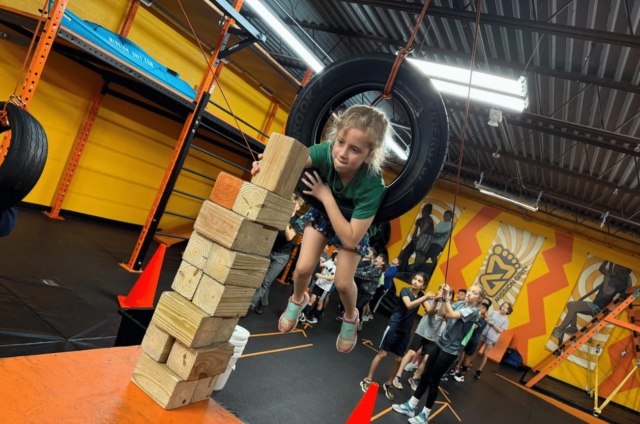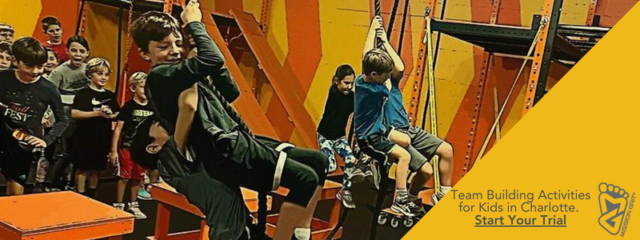How to Develop Leadership in Kids — 10 Ways
Natural leadership qualities in children may help them become good leaders, but experience and training are essential for lifelong success. Luckily, parents can play a significant role in teaching kids leadership skills. Here’s Mission Grit’s advice on how to raise a leader child, primed to live their best lives.

What Is Kids Leadership?
Leadership is the potential to influence the behavior of others towards the realization of a goal. Motivational speaker Tony Robbins says it’s “a powerful skill that can be developed over time.” There is no single personality type that equates to great leadership. Therefore, leadership for kids can be taught.
True leaders inspire others to act while simultaneously directing the way they act. They are personable and possess critical thinking skills that determine the most effective use of resources. There are many leadership activities for kids to help them develop interpersonal skills, communication skills, and emotional intelligence to become leaders in their lives and others’.
Building Leadership Skills in Kids: Why It Matters

Want to know how to raise a child to be a leader? A key predictor of strong leadership is healthy self-esteem. Setting boundaries, positive reinforcement, and allowing them to face life’s challenges head-on builds strong leadership characteristics. Cultivating leadership qualities in children is important for the following reasons:
- Leadership demands confidence, which is necessary for all aspects of our lives.
- As screens dominate our lives, the need to develop face-to-face communication skills becomes more pressing. Whether it’s in a social or school setting, being able to communicate clearly is a core component of a well-adjusted human being.
- People don’t leave companies; they leave bad leaders and managers.
Confident kids have healthy self-esteem and are not scared of failure or success.
Successful individuals know to get along with others, listen intently, and can think out of the box. As AI develops, the need for soft skills increases, so leadership skills can prime kids for the future world of work.
Let’s look at how to make your child a leader…
10 Ways to Develop Leadership Skills in Children
There’s no set of rules on how to develop kid leadership skills. Professionals agree the best way is by example and providing an environment that helps nurture leadership qualities through practical application.

1. Promote Teamwork
Leadership qualities in children are developed quickly through teamwork. Getting kids to help with chores or letting them participate in team-based extracurricular activities can accelerate the mastering of communication, social, problem-solving, and cooperation skills. Through teamwork, kids utilize their natural talents to accomplish a group goal. Working with others quickly reveals their natural aptitudes and areas they need to work on.
2. Volunteering Activities
Volunteering gives kids a different perspective. This sparks creative thinking around the solution to real-world problems. But more than that, it teaches kids to be of service. Every great leader is focused on a people or cause. So, if you wonder how to raise a child to be a leader, teach them how to be of service to something apart from themselves.
Young ones are curious and inclined to ask many questions around the why, how, and what they can do to help.
3. Set a Good Example
A child’s first teacher will always be their parents. Research by the University of California by psychologist Diana Baumride in the 1960s found there are three parenting styles:
- Permissive: The parent is non-punitive and accepting of the child
- Authoritarian: The parent tries to shape and control the child based on a set standard of conduct
- Authoritative: The parent tries to direct the child rationally.
The ideal is authoritative, which allows kids to grow up respecting authority without feeling strangled by it or blindly loyal to it.
4. Enroll in Camps
Kids’ camps can be an important catalyst for developing leadership skills in children. They teach kids the importance of social leadership through games, discussion, role-playing, and teamwork activities. At camps, kids are surrounded by others their age throughout the process, which provides them with the support and peer mentorship needed for personal growth. Collaborative summer camps also foster teamwork, a prerequisite for leadership.
5. Surround Them with Leaders
An old and somewhat cliché saying by motivational speaker Jim Rohn goes, “You’re the average of the five people you spend the most time with.” There’s no better way to develop leadership skills in kids than by surrounding them with leaders. And by leaders, we mean people and friends who are positive influences. Social learning theory posits kids model their behavior off of adults. So, you want to ensure they look up to the right role models.
6. Give Them Choices

Character and leadership activities for kids include creating opportunities for them to make choices. For instance, allowing them to select what to wear, or choose between different snacks, requires consideration. As they get older, they need to be comfortable making choices. More than that, they also have to be okay with being accountable and accepting the consequences of their choices.
7. Teach Communication Skills
Communication skills go together with emotional intelligence. It’s not so much what one communicates, but how and the function of the communication. For instance, if a kid is upset, they should have the ability to explain why, rather than just saying they’re upset.
If you’re wondering how to teach leadership to kids, it’s by example. Next time they act out, ask them to explain why and invite a constructive conversation about how their feelings and behavior are connected. Placing them in group environments, like after-school programs, will also force them to learn how to better communicate with others.
8. Encourage Perseverance

9. Let Them Choose Their Own Trail
How to make your child a leader? Don’t live vicariously through them. Children who know themselves, and follow their passions and interests, are far more likely to become good leaders. Kids are naturally curious, ambitious, and enthusiastic but often lose these attributes as they get older. Passion is palpable. When a leader is passionate, it’s easier to motivate and inspire others. Similarly, a passionate kid will do and be more.
10. Nurture an Entrepreneurial Spirit
Teaching kids leadership skills like entrepreneurship give them a can-do attitude despite challenges. Developing resilience and appreciation of failure is an important life skill. When kids are unafraid of failure, they’re more inclined to persist and keep trying. When you teach them to fail early and often, they’ll learn faster and try again, rather than dwelling on unsuccessful attempts.
Conclusion
Mission Grit’s fun adventure obstacle course and team-building classes are developed to let kids explore their potential. Through fitness exercises and team-building challenges, kids learn more about themselves and others. Powered by military veterans, our mission is to help kids become the best versions of themselves — both leaders in their own lives and others! Contact us.





